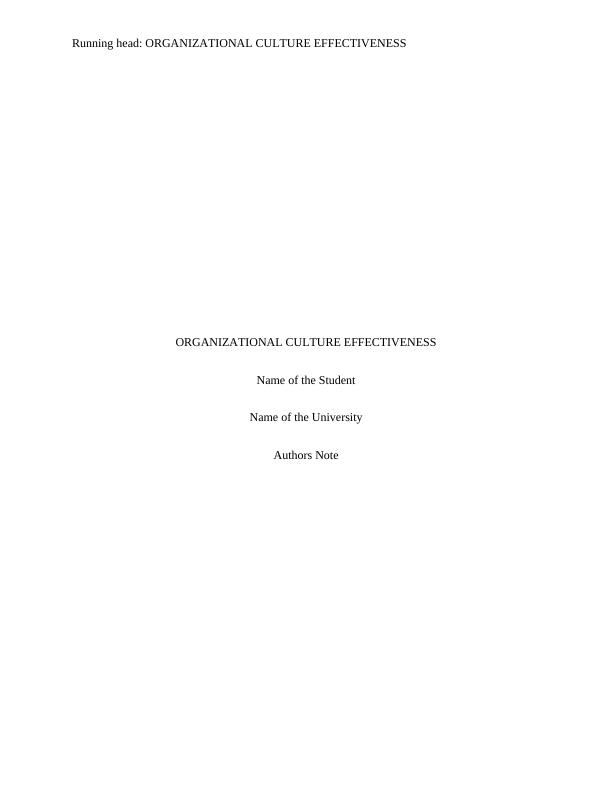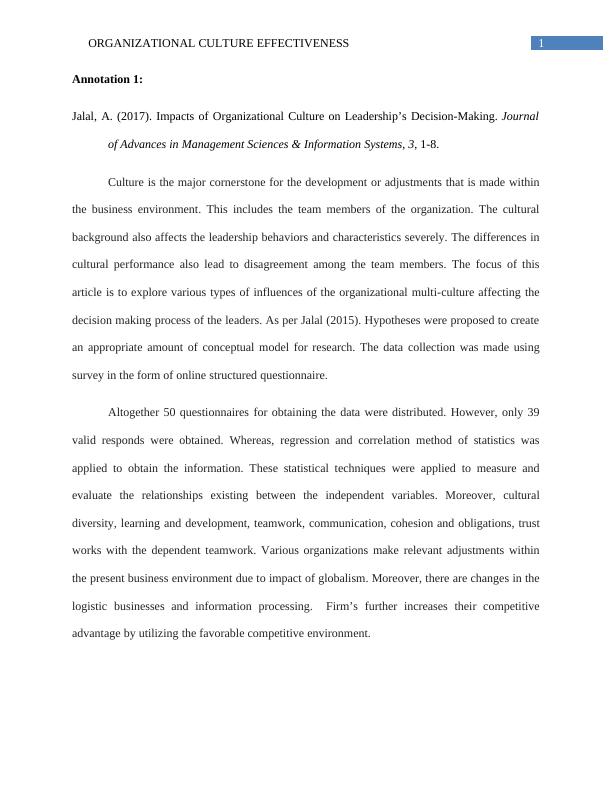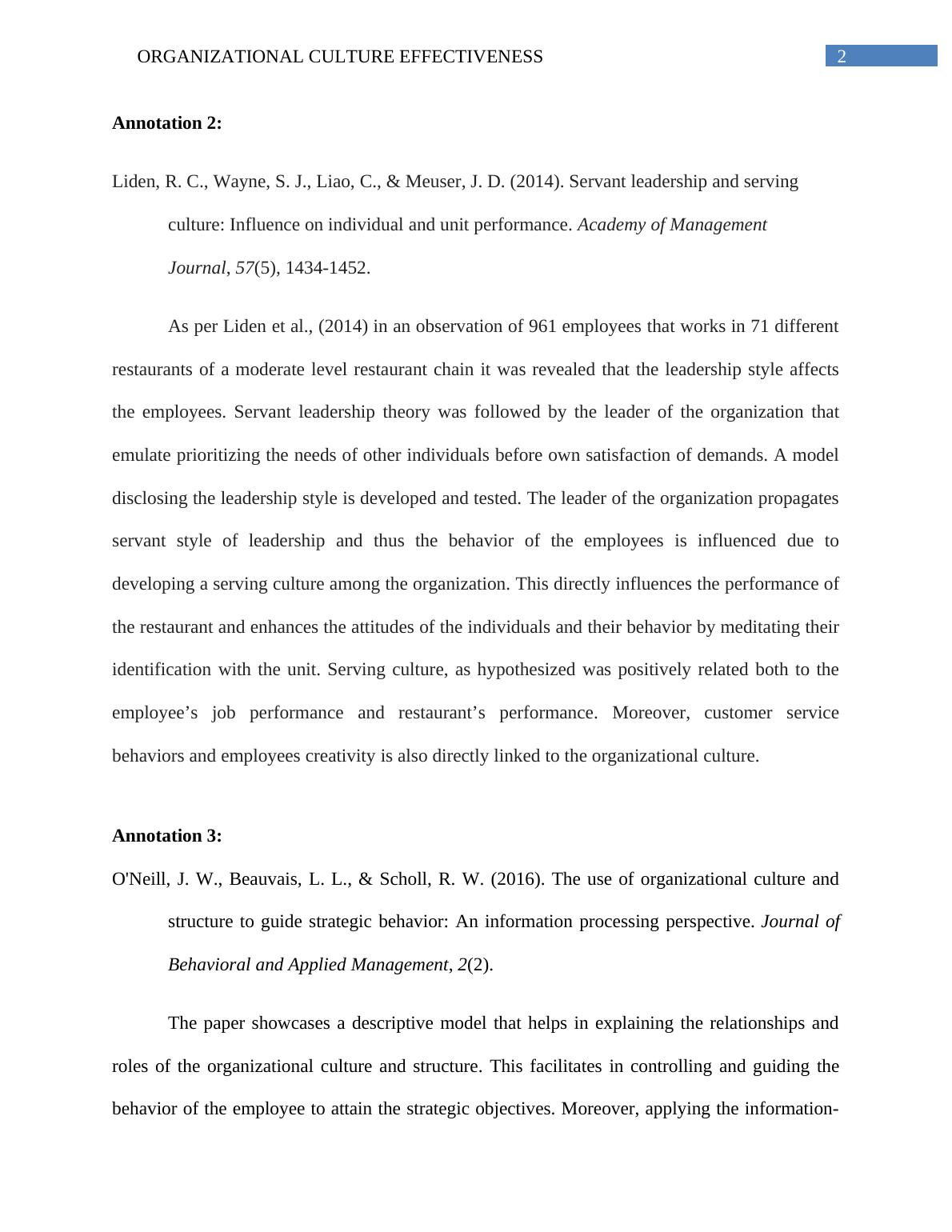Organizational Culture and Effectiveness
Added on 2021-04-17
8 Pages1662 Words81 Views
Running head: ORGANIZATIONAL CULTURE EFFECTIVENESSORGANIZATIONAL CULTURE EFFECTIVENESSName of the StudentName of the UniversityAuthors Note

1ORGANIZATIONAL CULTURE EFFECTIVENESSAnnotation 1:Jalal, A. (2017). Impacts of Organizational Culture on Leadership’s Decision-Making.Journalof Advances in Management Sciences & Information Systems,3, 1-8.Culture is the major cornerstone for the development or adjustments that is made withinthe business environment. This includes the team members of the organization. The culturalbackground also affects the leadership behaviors and characteristics severely. The differences incultural performance also lead to disagreement among the team members. The focus of thisarticle is to explore various types of influences of the organizational multi-culture affecting thedecision making process of the leaders. As per Jalal (2015). Hypotheses were proposed to createan appropriate amount of conceptual model for research. The data collection was made usingsurvey in the form of online structured questionnaire. Altogether 50 questionnaires for obtaining the data were distributed. However, only 39valid responds were obtained. Whereas, regression and correlation method of statistics wasapplied to obtain the information. These statistical techniques were applied to measure andevaluate the relationships existing between the independent variables. Moreover, culturaldiversity, learning and development, teamwork, communication, cohesion and obligations, trustworks with the dependent teamwork. Various organizations make relevant adjustments withinthe present business environment due to impact of globalism. Moreover, there are changes in thelogistic businesses and information processing. Firm’s further increases their competitiveadvantage by utilizing the favorable competitive environment.

2ORGANIZATIONAL CULTURE EFFECTIVENESSAnnotation 2:Liden, R. C., Wayne, S. J., Liao, C., & Meuser, J. D. (2014). Servant leadership and serving culture: Influence on individual and unit performance.Academy of Management Journal,57(5), 1434-1452.As per Liden et al., (2014) in an observation of 961 employees that works in 71 differentrestaurants of a moderate level restaurant chain it was revealed that the leadership style affectsthe employees. Servant leadership theory was followed by the leader of the organization thatemulate prioritizing the needs of other individuals before own satisfaction of demands. A modeldisclosing the leadership style is developed and tested. The leader of the organization propagatesservant style of leadership and thus the behavior of the employees is influenced due todeveloping a serving culture among the organization. This directly influences the performance ofthe restaurant and enhances the attitudes of the individuals and their behavior by meditating theiridentification with the unit. Serving culture, as hypothesized was positively related both to theemployee’s job performance and restaurant’s performance. Moreover, customer servicebehaviors and employees creativity is also directly linked to the organizational culture.Annotation 3:O'Neill, J. W., Beauvais, L. L., & Scholl, R. W. (2016). The use of organizational culture andstructure to guide strategic behavior: An information processing perspective.Journal ofBehavioral and Applied Management,2(2).The paper showcases a descriptive model that helps in explaining the relationships androles of the organizational culture and structure. This facilitates in controlling and guiding thebehavior of the employee to attain the strategic objectives. Moreover, applying the information-

End of preview
Want to access all the pages? Upload your documents or become a member.
Related Documents
Annotated Bibliography: Scholarly Business Communicationlg...
|9
|2156
|407
Servant Leadership: Pros and Cons for Organizational Behaviorlg...
|8
|2125
|488
Importance of Emotional Intelligence in Effective Leadership and Employee Performancelg...
|6
|1427
|197
Analysis of Existing Research | Literature Review Resourceslg...
|16
|2873
|67
Ethical leader and Unleader - make presentation and conclustionlg...
|6
|314
|95
Effective Team Leadership and Performance: A Studylg...
|9
|684
|163
